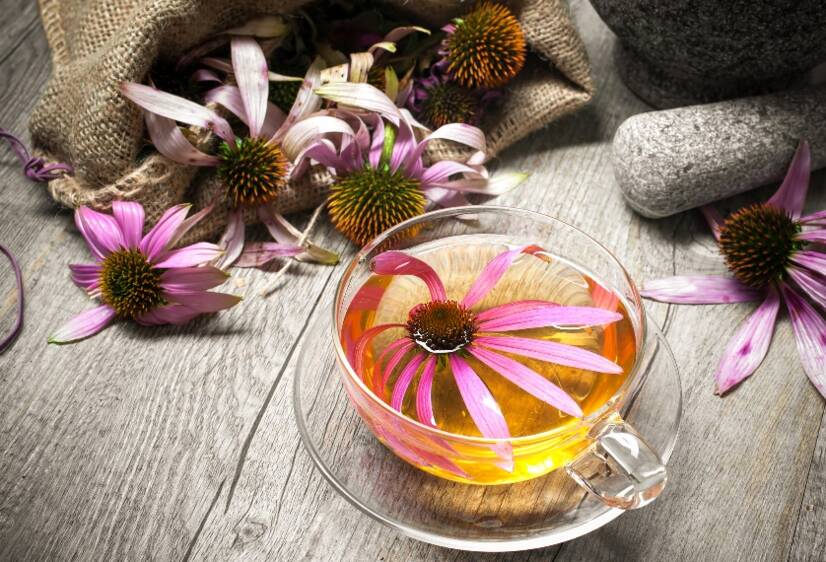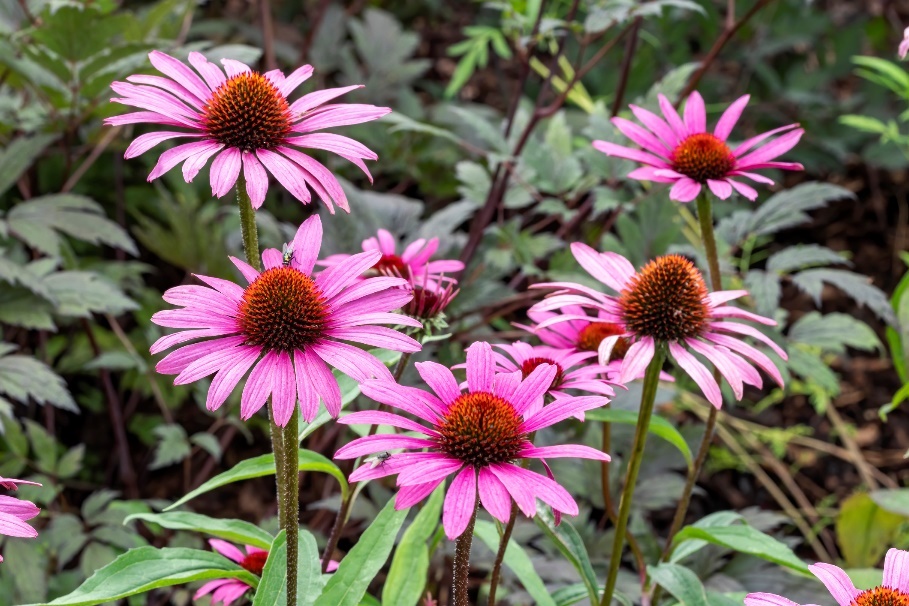- MCNEILL, Brigit Anna. Herbarium : health from nature : basic medicinal herbs and plants. Translated by Iva HAVLÍČKOVÁ. Prague: Publishing House, s. r. o.: ISBN 978-80-7625-180-9.
- solen.cz - Echinacea - medicinal effects and possible interactions. Solen. doc. PharmDr. Lenka Tůmová, CSc.
- Echinacea: benefits, uses, side effects and dosage. Healthline. Ryan Raman, MS, RD
- Solen.com - Echinacea sp. - contents and medicinal uses. Solenina. doc. RNDr. Jiřina Spilková, CSc.
Echinacea and health effects. Natural immunity support? + Growth

Echinacea or Echinacea is a world-famous herb native to North America. It is especially known for its anti-inflammatory effects, immune support and healing. What are all the effects of echinacea on human health?
Characteristics
Echinacea can be obtained in various forms of dietary supplement such as tincture, powder, extract in capsules or oil. It is used for internal and external use.
In many countries, it is a natural anti-inflammatory agent and prevention against various infections.
In this article you can read about the content and composition, health effects, contraindications, dosage, home cultivation and many other interesting information.
What is echinacea?
Despite its American origins, echinacea comes from the Greek name echinos and literally means hedgehog. The name was chosen because of its resemblance to this animal.
Echinacea is a perennial plant in the star family that grows to a height of around 1 metre. It has a rough hairy stem with leaves. The flowers of the plant are composed of purple (pinkish-purple) petals and a brown prickly flower. It is the centre of the plant that looks like a hedgehog.
The plant has several subspecies, such as pale echinacea, narrow-leaved echinacea or conspicuous echinacea. However, the most common and best known is purple echinacea(Echinacea purpurea).
In terms of beneficial substances, the root is the most used part of the plant, but the herb itself is equally important.
Echinacea naturally strengthens the immune system and the body's defences.
It helps in the prevention and treatment of acute and chronic inflammatory diseases, infections of the respiratory system, skin and vascular diseases. Its natural anti-cancer effect is being investigated.
Forms of echinacea processing:
- Dried herb
- Tea mixture
- Extract in capsule/tablet
- Ground powder
- Tincture, drops
- Oil
- Ointment, cream
Contents and composition of Echinacea
Echinacea contains a wide range of active substances. Due to its high content of polyphenols, polysaccharides, alkamides, flavonoids, glycoproteins, vitamins, essential oils and plant compounds, echinacea has many health benefits.
It also contains a caffeic acid derivative that is anti-inflammatory and anti-atherosclerotic.
Echinacea is rich in compounds that act as antioxidants in the body. Antioxidants are substances that help protect our cells from oxidative stress.
Flavonoids are just considered natural antibiotics. They protect the body from the harmful effects of free radicals and have a strong anti-inflammatory and antibacterial effect. Tannins increase the body's defenses.
Plant compounds support the strengthening of the immune system. They support the lymphatic system and the natural detoxification of the body.
The herb can also promote proper healing of superficial injuries.

Internal use
What benefits does echinacea offer? What effect does it have on...
Echinacea and its beneficial effects on the body
Thanks to its wide range of active substances, the herb echinacea is considered a natural "panacea" in some cultures and countries.
Supporting the immune system and immunity
The plant is a natural aid to the body's natural defences against various bacterial and viral infections.
The active substances contribute to the reduction of oxidative stress, which results in the development of various diseases of civilization, including cardiovascular and diabetes mellitus (diabetes).
Many studies have found that this particular plant can help to strengthen the immune system and significantly speed up recovery from an ongoing illness. Echinacea is therefore commonly used, particularly for the prevention and treatment of the common cold.
The mechanism of echinacea in supporting immunity is through activation of macrophages (cells of the immune system), phagocytosis and stimulation of fibroblasts in the body.
Anti-inflammatory effect
Inflammation is our body's natural way of defending itself and promoting healing. The herb helps the body to absorb inflammatory reactions more quickly. This is the case in both acute and chronic inflammatory diseases.
It helps fight the symptoms of different types of infections - respiratory or excretory (urinary). In some studies, echinacea has helped reduce inflammatory markers (CRP levels) in the blood.
Anti-tumour potential
Various studies have investigated the effect of echinacea extract against cancerous growth. The herb can act as a supportive treatment in certain doses, suppressing the growth of cancer cells and possibly inducing the death of cancer cells.
Echinacea as a natural 'panacea' is therefore the subject of much research. Its natural anti-cancer potential is being investigated.
Promoting healing and skin health
Echinacea creams, ointments or tinctures are used to promote the healing of wounds and skin surface damage. Echinacea has a beneficial anti-inflammatory effect on scars, burns, bedsores (decubitus ulcers) and skin eczema.
Summary of the beneficial effects of Echinacea:
- Support of the immune system and immunity
- Anti-inflammatory effect (antiviral, antibacterial)
- Antioxidant effect
- Elimination of inflammation in acute and chronic diseases
- Support cardiovascular health
- Support respiratory health
- Promoting urinary tract health
- Promoting wound healing
- Promoting healing of skin problems
- Support acne treatment
- Anti-tumour potential
Echinacea as a dietary supplement
A large variety of dietary supplements containing Echinacea are available on the market today. Both for internal and external use.
Tinctures should be taken for a maximum of 2 weeks, followed by a break of at least a few days. This is approximately 1-2 ml 3 times a day, unless otherwise stated on the product packaging.
Extracts in capsule or tablet form tend to be fortified with vitamin C and zinc to support immunity and maximise the effects of echinacea. It is taken orally on a regular basis. There is an average of 300 mg of echinacea extract per tablet.
Loose or sachet echinacea tea is also used, which is known for its distinctive flavour and aroma. The herb is also often found in other complex tea blends to support immunity and resistance.
It is useful as a warm tea for colds, respiratory and urinary tract infections.
Echinacea and dosage
The exact dosage always depends on the part of the plant and the form in which the echinacea is processed (dietary supplement, tincture, tea). It is therefore necessary to follow the dosage recommendation on the packaging of the specific product.
Do not exceed the stated maximum daily dose.
Currently, there is no official dosage recommendation. Some sources give 3 g of dried plant per day, but different medical research studies for different ailments give different recommended and maximum doses of echinacea.
External use
Dermatological cosmetic products with echinacea extract have a positive effect on the aesthetics and health of the skin.
The anti-inflammatory effect is used in the prevention and treatment of acne. It contributes to the nourishment and hydration of the skin.
In dermatological studies, products containing echinacea extract have been found to improve and reduce wrinkles and help restore the skin's protective layer.
It also serves as a natural disinfectant for external use. Tinctures are also often used to make ointments for dermatoses and eczema.
Harvesting and storage
How to grow echinacea? Is it possible at home?
Growing echinacea at home
Growing echinacea in home conditions is relatively easy.
Plant the purchased seeds shallowly to a depth of about 1 cm. These are then covered with a layer of soil.
Echinacea thrives best in nutritious loamy and sandy soil.
You can also grow Echinacea in a larger pot, but loose soil is preferable.
Echinacea can spread quite quickly, so plant the seeds far enough apart to give the Echinacea plenty of space. The best time to plant is in spring. Echinacea tends to flower from June to October.
When planting, choose a location with partial shade. Echinacea is thermophilic, but does not thrive in direct sun all the time.
It also needs to be protected from strong winds and cold.
After planting, the plants should be watered regularly and lightly.
Echinacea does not like severe frosts. Therefore, remove bad flowers before winter arrives and pack more soil to the roots to ensure overwintering.
The whole plant can be used and harvested to make homemade teas and medicines.
The flower and stem are harvested when the plant is in full bloom. It is then dried in the shade. The root to be harvested must be at least 2 years old.
Who should be vigilant when taking echinacea?
Although side effects from taking echinacea are rare, they may occur in some individuals.
These are mainly digestive problems (abdominal pain, nausea) and allergic reactions (swelling, rash, eczema...).
If you would like to give dietary supplements containing echinacea to young children, you should always consult your paediatrician.
Numerous studies point to its unsuitability during a woman's pregnancy. Therefore, its use in pregnant and lactating women should be consulted with a gynaecologist.
Echinacea stimulates the immune system. Therefore, it should definitely be avoided by people with autoimmune disorders or those taking immunosuppressive drugs.
Echinacea can cause allergic reactions in children and adults who are allergic to star plants, i.e. ragweed, chrysanthemums, marigolds or daisies.
If you have been diagnosed with these allergies, consult your allergist.
Interesting resources
Related










